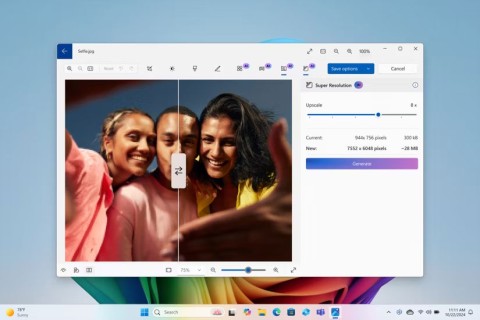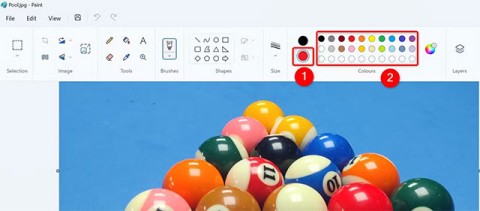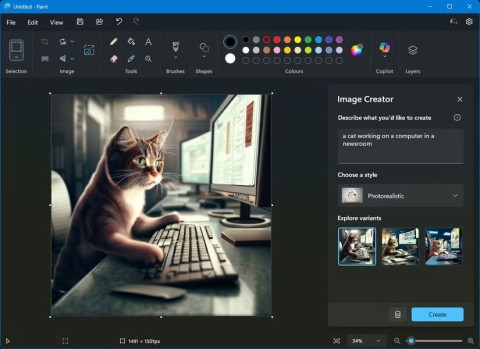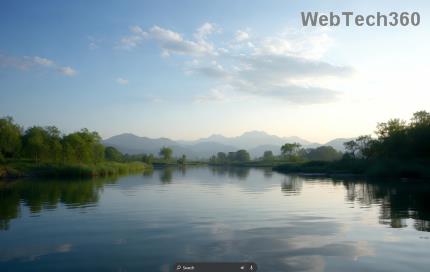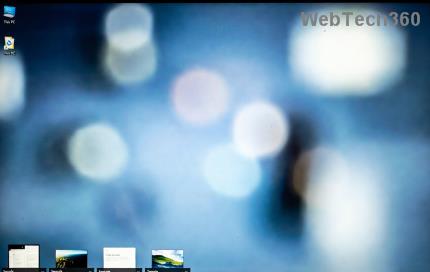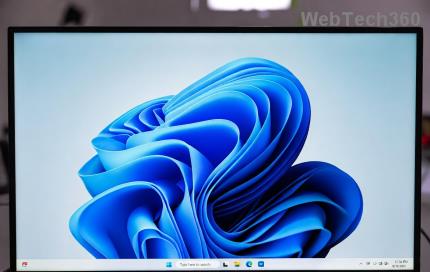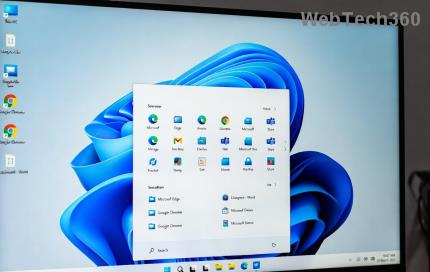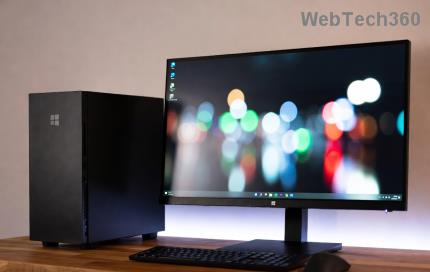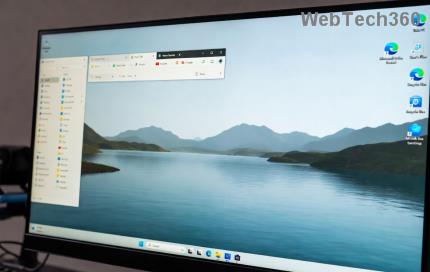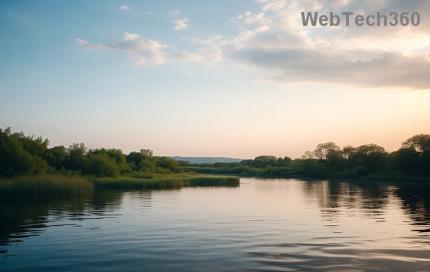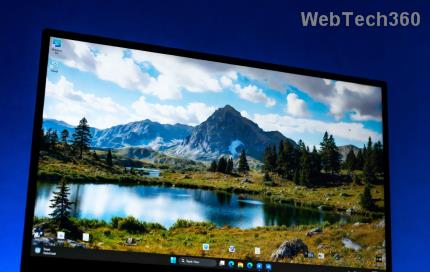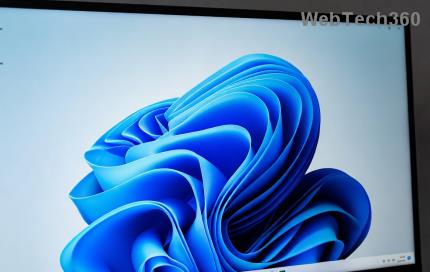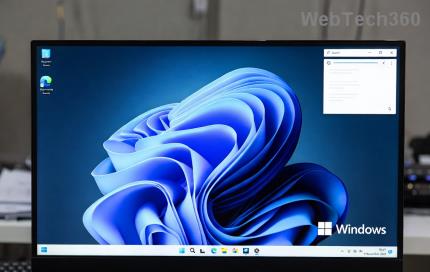How to remove Edit with Paint option in Windows 11
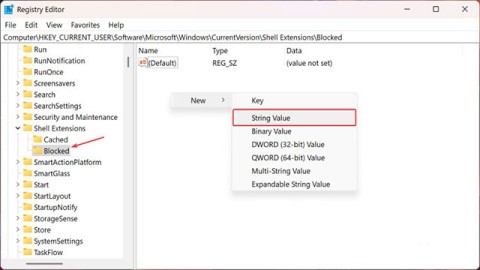
In fact, the process is the same as removing the Edit with Notepad or Edit with Photos options.
Taking screenshots is a basic but important skill that everyone should know. Although hoping to have a tool to support both shooting and editing photos, sometimes, you are stuck in the middle, and then wonder how to "beautify" photos taken with Microsoft Paint.
Although not ideal, the article will show you how to edit basic screenshots via MS Paint. This is especially useful when you are using a friend's or someone's computer and can't install anything.
Before learning how to edit screenshots on your computer, you need to know how to do it first. Using Microsoft Paint is one of the most basic methods.
First, press the Print Screen key ( PrtScn for short or similar) to copy everything on the desktop to the clipboard. If you have multiple screens but only want to take a screenshot of the current screen, press Alt+ PrtScn.
Next, open Microsoft Paint. You can do this easily by opening the Start menu , typing paint to search for it.
When Paint opens, press Ctrl+ V(shortcut key instead of Paste) to place the screenshot into Paint. If you don't need to modify the output for the print screen, simply press Ctrl+ S(or go to File> Save as ) to open the Save dialog box and name the image.

If you want a more powerful built-in tool to take screenshots, try the Snipping Tool. Find it by typing snipping into the Start menu . Instead of capturing the entire screen with PrtScn, this tool allows you to select an area or window on the screen to capture, greatly reducing later editing.
In future versions of Windows 10 , the Snipping Tool functionality will switch to the new Snip & Sketch application. You can access this app with the shortcut Win+ Shift+ S.

Here are some ways to edit photos you need to know in Paint. Although implemented on Windows 10, these methods still work in older versions.
If you capture the entire window in the screenshot, you probably don't want to show all the windows. Cutting is the simplest solution for this.
To crop the screenshot, simply select the Select tool from the top Ribbon. If you don't see it, double-click on the Home tab to open it. The default selection is rectangular. If you want to change, click on the arrow keys below. Drag the mouse pointer over the area you want to keep, click the Crop button in the top bar to crop the selected area.

If you want to cut from the edges, take one of the white boxes on the bottom, right or bottom right of the canvas in Paint. You can drag it to easily cut off unwanted bits from those edges. If you drag the edges outwards, you will make the canvas bigger.
Using the box to highlight the parts of a photo is a simple and non-annoying solution. Paint has this feature integrated on the Shapes section of the Ribbon.
First, select a rectangular or circular box. Next, in Outline , choose Solid color , set Fill to No Fill . Select Size for border thickness, select the color on the right. Red will generally attract attention.

Here, drawing the box becomes extremely simple. Hold down Shiftthe key while drawing to create the perfect square. Then use the white box on each side to resize the shape. Press Ctrl+ Zto undo and try again if not as desired.
If the box doesn't fit, the arrows can help you point out something in the screenshot. Because they are in the Shapes menu , they work the same way.
Choose one of the 4 arrows based on the direction you need, then, select the line size and color them. With arrows, you may want a Solid color in the Fill to make the arrow easier to see. Paint will use Color 2 as the fill color, so place it like Color 1 for a uniform arrow.

Like a box, just use your mouse to draw the arrow shape. Hold Shiftto maintain symmetry.
If the screenshot contains sensitive information, such as a serial number or a friend's photo, you might want to delete them before sharing. Paint doesn't have a one-click solution to blur them out, but you can do this manually.
The easiest and most neat way is to use the Select tool to highlight the area you want to blur. Grab one of the small handles at the corner of the image, shrink the selection, then let go. Next, using the same handle, resize the selection to its original size.

After doing this, the text or image will be blurred to the point that it is hard to recognize. The smaller the selection, the more blurry the image. If you're not satisfied, press Ctrl+ Zand repeat this whole process or just repeat it over the faint text area for further refining.
If you don't like this method, you can use some rectangles or features in the Shapes tool and simply draw over the sensitive parts to blur them out. If you want the best results, use the Eyedropper tool to make the box the same color as the background.
Occasionally, you may need to insert instruction text into the screenshots. Paint makes this easy with the Text tool , represented by the A icon on the Ribbon. Select it, then click where you want to place the text in the image.
When you click, you will see a text box and can start typing immediately. By default, it sets the font size to be small, so you'll want to use the Text tab on the ribbon to make the necessary changes.
Here, you can adjust the font and its size, choose a transparent or opaque background, and change the text color. To change the properties of the current text, press Ctrl+ Ato select all first, then make corrections. Click and drag the box around the text to move it or use the handle to resize it as needed.

Be careful with this process, when you click on the text box, Paint will keep it in this position permanently. You can't move it later, so hit Ctrl+ Zand try again if it's not in the right position.
Need more space to take a screenshot or want to adjust the entire image? You can use the Resize and Rotate buttons on the Image section .
When the box maintains aspect ratio is checked , the Resize tool allows you to reduce the image size without losing much quality. You can choose to resize it in percent or absolute pixels.

Rotate and Skew tools are not useful when editing screenshots but they are always ready to serve you when needed.

After finishing editing, the last step is to save the screenshot. Like most photo editors, Paint offers you several file format options, including PNG and JPEG.
PNG images are of a higher quality, but take up a lot of storage space. JPG photos are lower in size, but usually less sharp than PNG.
If you do not need the smallest possible file size, you should save the screenshot as PNG for best quality. You can always create a JPEG copy to share later.
The above are the basic ways to edit screenshots on PC with MS Paint in case there is no other solution. If you have to work with regular screenshots and your computer has professional photo editing software installed , you should look for better tools because it offers many features that make it easier to "enchant" the image. . In addition, you can refer to 9 ways to make computer screenshots the simplest and most common .
Hope the article is helpful to you.
In fact, the process is the same as removing the Edit with Notepad or Edit with Photos options.
The latest updates to this photo and graphics editor introduce Generative AI features, showing that the app can still be relevant today.
If your photos contain sensitive content that you don't want others to see, hide those parts of the content using the tools at your disposal. You can use the built-in tools available on your Windows 11 PC to do this.
Recent advances in AI have transformed Paint from a basic drawing program into a surprisingly powerful and versatile image editing application.
Discover how to use Windows 11 Quick Assist for seamless remote support. Learn step-by-step setup, troubleshooting, and tips to help friends or family with tech issues instantly.
Struggling with dual monitor lag on Windows 11? Discover proven troubleshooting fixes to eliminate stuttering, delays, and performance issues for seamless multi-monitor setups. Step-by-step guide inside.
Struggling with the frustrating Windows 11 "Startup Settings" blank error? Discover proven, step-by-step fixes to restore your boot options quickly and get your PC running smoothly again. No tech expertise needed!
Discover how to activate Windows 11 Enterprise using KMS effortlessly. This comprehensive guide covers everything from requirements to troubleshooting, ensuring seamless activation for your business needs.
Struggling with the dreaded KMODE EXCEPTION NOT HANDLED error on Windows 11? Discover proven, step-by-step fixes to resolve this blue screen nightmare quickly and get your PC running smoothly again. No tech expertise needed!
Struggling with Windows 11 "Motherboard" Driver Error? Discover proven troubleshooting steps to fix it fast and get your PC running smoothly again. Easy, step-by-step guide for beginners.
Struggling with ping spikes on Windows 11 over Wi-Fi? Discover proven fixes to stabilize your connection, reduce lag, and enjoy smooth gaming or streaming. Step-by-step solutions for instant results.
Accidentally deleted precious photos? Discover proven methods to recover deleted photos in Windows 11 effortlessly. Step-by-step guides, tools, and tips to restore your images safely.
Discover how to use Windows 11 Terminal instead of CMD for a modern, efficient command-line interface. Learn installation, setup, and tips to boost your productivity with tabs, themes, and more.
Discover safe, legitimate ways to activate Windows 11 Pro without a product key. Learn step-by-step methods using built-in tools and official Microsoft options to get your OS up and running smoothly. No risks, no hassle – just pure productivity.
Struggling with battery drain during hibernate in Windows 11? Discover expert fixes to preserve your laptop
Struggling with input lag in Windows 11 while playing Valorant or CS2? Discover proven, step-by-step fixes to restore smooth gameplay and boost your performance. Say goodbye to delays and hello to precision shots.
Struggling with the frustrating "Out of Memory" error in Microsoft Edge? Discover proven, step-by-step fixes to reclaim your browsing speed and stability. Updated with the latest tips for optimal performance.
Struggling with Google Drive not launching on Windows 11? Discover proven fixes to resolve the issue fast, from restarts to advanced troubleshooting. Get your cloud storage working seamlessly today!
Discover how to disable Game Bar Presence Writer on Windows to optimize gaming performance. Step-by-step guide to reduce lag, boost FPS, and enhance your setup for smoother gameplay. Essential tips for gamers in 2026.
